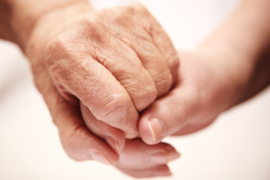
A neighbor faced a similar dilemma. She learned an acquaintance was diagnosed with a terminal illness and was receiving treatment. Before she could reach out with a note or a card, she bumped into him on the street. Tongue-tied she wondered, "What can I say?" Are there any words of comfort for a terminal illness?
Many of us face similar situations. We send cards, write notes, express our concern, but when placed face-to-face with the individual grappling with loss, we just can not fathom what words will bring comfort.
Whether someone is chronically or terminally ill or dealing with sudden or shocking death, their world is turned upside down. It is hard to function in that state of mind and yet, here they are, trying to continue their lives in the spirit in which they have lived. So when you see them at work, at a meeting, on the street, or in a restaurant, an appropriate response is, “I’m so glad to see you,” said with a handshake, a hug, or whatever greeting feels appropriate.
Do not avoid or shy away from someone dealing with illness or any type of loss. Greet them and let them know you care. And do it every time you see them. It is how each of us would like to be treated in our time of need.
Robbie Miller Kaplan is an author who writes from a unique perspective as a mother who has lost two children. She has written How to Say It When You Don't Know What to Say, a guide to help readers communicate effectively when those they care about experience loss, available in ebooks for "Illness & Death," "Suicide," "Miscarriage," "Death of a Child," "Death of a Stillborn or Newborn Baby," "Pet Loss," "Caregiver Responsibilities," "Divorce" and "Job Loss." All titles are in Amazon's Kindle Store.









 RSS Feed
RSS Feed
